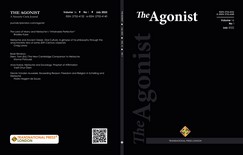Nietzsche and Ancient Greek, Oral Culture: A glimpse of his philosophy through the anachronistic lens of some 20th Century classicists
Nietzsche and Ancient Greek, Oral Culture: A glimpse of his philosophy through the anachronistic lens of some 20th Century classicists
Author(s): Craig Stuart LanzaSubject(s): Cultural history, Metaphysics, Oral history, Ancient World, Ancient Philosphy, 19th Century Philosophy, Philology
Published by: Transnational Press London
Keywords: Fredrich Nietzsche; Ancient Greeks; philosophy; Oral culture; Greek Culture and Nietzsche; Classical Metaphysics; Monotheism;
Summary/Abstract: In 1869, Fredrich Nietzsche was not a philosopher in any professional capacity. He was an exceptionally talented young philologist at the University of Basel in Switzerland who had not yet ruined his promising career identifying himself with Richard Wagner and publishing The Birth of Tragedy. In May of 1869, he had only just met Richard Wagner and Wagner’s wife, Cosmina. In those years, Nietzsche’s career revolved around his reading knowledge of numerous, ancient languages which included several Indo-European ones (Latin, Ancient Greek, and Sanskrit) as well as Hebrew. He concerned himself professionally with the ancients; cultivating a refined understanding of the common characteristics of Bronze Age and Early Iron Age Western Civilization, including its sentiments, thought, and arts. In sum, for years of his life, Philology was his métier and he was, by most accounts, exceptionally good at it.
Journal: The Agonist
- Issue Year: 16/2022
- Issue No: 1
- Page Range: 33-46
- Page Count: 14
- Language: English

